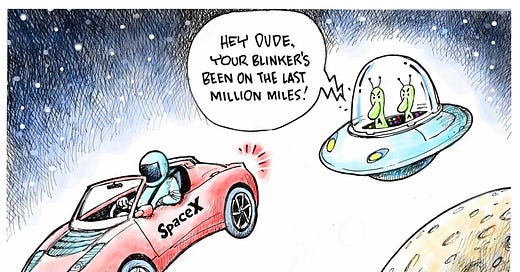Robots Are Winning: SpaceX Launches Starship, while AutoGPT Takes Over Daily Tasks.
Dear Investors,
Welcome to this week's edition of the Myth of Money! We're thrilled to announce that we've crossed the 20,000-subscriber mark and couldn't be more eager to continue expanding our readership and nurturing our community.
SpaceX launches the Starship, which explodes.
In a key step in American space innovation, SpaceX launched a fully integrated Starship launch vehicle for the first time on Thursday morning, marking a significant milestone in the vehicle development program. Proponents have argued that this was the first step on the path to humans becoming an interplanetary species and eventually going to Mars.
The orbital test flight exceeded numerous expectations. The vehicle successfully passed through Max Q – the point at which the most aerodynamic pressure is exerted on the vehicle – and continued to fly for nearly three minutes, despite eight of its 33 rocket engines failing. The rocket reached an altitude of almost 40 kilometers, arriving at the stage separation point. However, the upper stage failed to separate from the booster, resulting in uncontrolled tumbling and a midair explosion.
Despite the dramatic ending, the test proved successful: SpaceX gathered a wealth of valuable data that will inform future Starship and Super Heavy prototypes. However, the test also served as a reminder that Starship mission timelines may require further adjustments.
Scott Bailey, a director at Virginia Tech's Center for Space Science and Engineering Research, referred to the test as a "huge success". He pointed out that during the Apollo era, around 100 rockets were launched before they felt confident enough to send people to the moon. This is simply how the process works.
Since its inception, SpaceX has adopted a "fail fast, but learn faster" mentality. This approach has involved numerous tests of its now-successful Falcon 9 boosters, some of which resulted in explosions. SpaceX's pace and adaptability set it apart from government agencies and other traditional aerospace companies. By embracing public failures, SpaceX can progress rapidly and learn swiftly.
SpaceX has three private human spaceflight missions lined up for its Starship. These include Japanese billionaire Yusaku Maezawa's dearMoon flight around the moon, the third mission in billionaire Jared Isaacman's Polaris Program, and another lunar mission later this decade, for which entrepreneur Dennis Tito and his wife Akiko booked two seats.
SpaceX has also secured valuable contracts with NASA, playing a vital role in the Artemis lunar landing program. Artemis III involves astronauts launching into space inside an Orion capsule atop a Space Launch System vehicle, followed by a rendezvous with a Starship human landing system. They'll then journey to the lunar surface and back. However, whether this mission can be executed as planned in 2025 remains uncertain.
AutoGPT is all the rage these days
The new subject of every AI-focused dinner conversation is Auto-GPT.
Essentially, Auto-GPT utilizes the adaptability of OpenAI's latest AI models to communicate with software and services on the internet, allowing it to "autonomously" perform tasks like X and Y. Yet, as we've seen with large language models, this capability can be both impressively broad and disappointingly shallow.
Auto-GPT, which has recently gained traction on social media, is an open-source app developed by game creator Toran Bruce Richards. It primarily employs OpenAI's text-generating models, such as GPT-3.5 and GPT-4, to operate "autonomously."
The autonomy of Auto-GPT isn't particularly mysterious. It simply manages follow-up interactions with OpenAI's models after an initial prompt, both posing and answering questions until a task is completed.
In essence, Auto-GPT is a combination of GPT-3.5 and GPT-4, supported by a companion bot that directs these models. Users provide a goal to Auto-GPT, and the bot leverages GPT-3.5, GPT-4, and various programs to execute the necessary steps to achieve that goal.
What sets Auto-GPT apart is its ability to interact with apps, software, and services both online and locally, such as web browsers and word processors. For instance, given a prompt like "help me grow my flower business," Auto-GPT can devise a somewhat reasonable marketing strategy and create a basic website.
If chat-GPT can tell your assistant what to do, Auto-GPT can automate their job altogether.
This Week By the Numbers 📈
Markets declined across the board this week as inflation worries continue to persist and investors expect several more interest rate hikes. Fed officials have warned that inflation is unlikely to go back to 2% for at least two years.
Remember, we have a historic precedent for much higher rates. Under the leadership of Federal Reserve Chairman Paul Volcker in the late 1970s and early 1980s, the Federal Reserve implemented a tight monetary policy to combat high inflation with the overnight rate reaching as high as 20% in June 1981.
Things are like to get worse before they get better.
Top Stories 🗞️
Coinbase Could Leave the U.S.
Two years after becoming a public company in the US, Coinbase has indicated that its exit from the country is not out of the question. CEO Brian Armstrong said “anything is on the table, including relocating,” noting that the UK is Coinbase’s second largest market. The remarks come as US regulators have ramped up enforcement actions against crypto companies in recent months. In a shareholder letter published in February, the company noted that 2023 is likely to be a crucial year for crypto policy that could help or hurt the industry, adding that the company was “preparing for both eventualities.” The SEC last month served Coinbase with a Wells notice — an alert that typically precedes an enforcement action — related to alleged securities violations. The company said in a statement that it is “confident in the legality of [its] assets and services,” and Armstrong later said Coinbase would be “happy to go to court” if necessary
Zimbabwe’s central bank to issue gold-backed digital currency
The Reserve Bank of Zimbabwe is set to introduce a gold-backed digital currency to serve as legal tender in the country. The move is a government initiative to stabilize the local currency from continued depreciation against the U.S. dollar. The move will allow small amounts of Zimbabwean dollars to be exchanged for the digital gold token, enabling more Zimbabweans to hedge against currency volatility. Reserve Bank of Zimbabwe Governor John Mangudya said the plan intends to “leave no one and no place behind.” Zimbabwe’s currency trades at 1,001 ZWL against $1 but is typically exchanged for 1,750 ZWL on the streets of Harare, the country’s capital, according to Bloomberg. The country’s annual consumer price inflation reached a one-year low in March at 87.6%, down from 92% in February.
Protesters storm Paris Euronext building in anger over pension law
A group of protesters briefly invaded offices of stockmarket operator Euronext in Paris' La Defense business district on Thursday, saying big companies must pay up to finance pensions, as part of wider protests against a rise in the retirement age. "We are told that there is no money to finance pensions," said Sud-Rail unionist Fabien Villedieu. But there is "no need to get the money from the pockets of workers, there is some in the pockets of billionaires." Waving union flags, the group of a few hundred protesters occupied Euronext's lobby, engulfed in red smoke from flares, and chanted words popular with pension protesters: "We are here, we are here, even if Macron does not want it we are here." They also shouted: "Macron resign!" Earlier this month, similar scenes occurred at Blackrock's Paris offices.
Texas ‘Proof of Reserves’ Bill Passes House of Representatives
The Texas House of Representatives, a 150-member lower chamber of the Texas State Legislature, has approved a bill that will require cryptocurrency exchanges to maintain reserves ‘in an amount sufficient to fulfill all obligations to digital asset customers.’ The bill seeks to amend the state's Finance Code to add a chapter on digital asset regulation that will ensure exchanges maintain funds in such a manner that all customers should be able to "fully withdraw" their assets. Additionally, the bill will prohibit digital asset service providers from "commingling," or mixing customer deposits, with other accounts including the provider's operating capital, proprietary accounts, digital assets, fiat currency or "other property that is not customer funds."
Abu Dhabi's Financial Free Zone Proposes Legal Framework for Decentralized Economy
The Abu Dhabi Global Market's (ADGM) Registration Authority is seeking feedback on its proposed legislative framework for distributed ledger technology (DLT), targeting disclosures, liquidation and governance structures. The ADGM is an international finance center within the United Arab Emirates (UAE) and has a bespoke licensing regime for virtual asset service providers supervised by its financial regulator. The authority is not the ADGM’s financial watchdog, so the proposal is limited to tackling matters of service type and governance. The proposed "DLT Foundations Regulations 2023" aims to set up a tailored legislative framework that considers "features of foundations that might be attractive to developers of DLT projects," which include decentralized autonomous organizations (DAO) – a favored governance structure for decentralized initiatives.
Thank you for reading this week’s edition of the Myth of Money.🚀
Until next week,
Tatiana Koffman
About the Author: Tatiana Koffman
Hi there and thanks for reading! If you stumble upon my newsletter, you will notice that I write about money, economics, and technology. I hold a JD/MBA and spent my career in Capital Markets working across Mergers & Acquisitions, Derivatives, Venture Capital, and Cryptocurrencies. I write to make financial topics more accessible and create equal opportunity for the next generation of investors. I have personally invested in 20+ companies and funds (👉 my portfolio).





